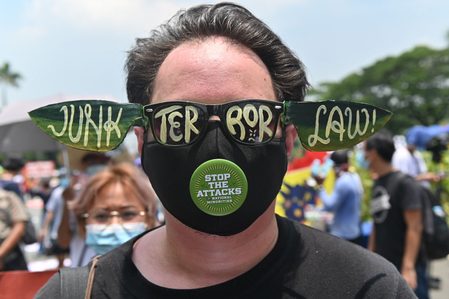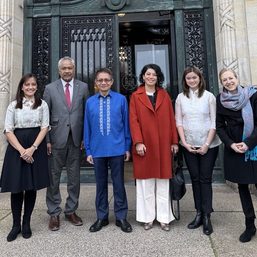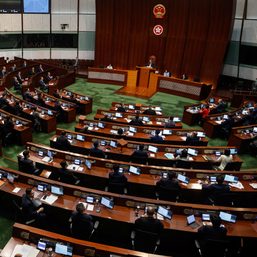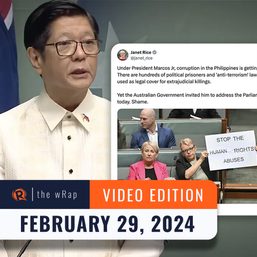SUMMARY
This is AI generated summarization, which may have errors. For context, always refer to the full article.
![[ANALYSIS] Gross violations of due process in Anti-Terror Law rules](https://www.rappler.com/tachyon/2020/10/tl-ata-irr-part-2.jpg)
The following is Part 2 of a two-part series. You can read Part 1 here.
Proscription, differentiated from designation, is the process by which the Court of Appeals declares a group of persons, organization, or association as a terrorist upon the verified application of the DOJ with recommendation from the NICA and authority from the ATC, and its application shall be filed with an urgent prayer for the issuance of a preliminary order of proscription.
If the application is considered to be sufficient in form and substance, and probable cause exists that the order is necessary to prevent the commission of terrorism, the preliminary order of prescription will be issued ex parte within 72 hours. In Rule 7.4, the Court of Appeals will conduct continuous hearings, which shall be completed within 6 months, to determine whether the preliminary order should be made permanent or lifted, a permanent order be issued, or the application be denied. Again, categorically, the IRR indicates in this provision that it shall be “the burden of the applicant to prove that the respondent is a terrorist xxx within the meaning of Section 26 of the Act before the court issues an order of proscription, whether preliminary of permanent.”
The permanent order of proscription is immediately executory and shall be valid for a period of 3 years from the date of publication, but 6 months prior to its expiration, the DOJ may cause the review of such order by filing for a verified application for reissuance of permanent order of prescription. The CA shall review this verified application for reissuance and shall resolve the same before the expiration of the 3-year period.
If the CA does not find any ground for which the application for proscription may be granted, any preliminary order of proscription shall be lifted and/or the subject of proscription shall be delisted. However, a denial for application for proscription shall not be a bar for a filing of another application, as long as it is shown that (a) it is grounded on new evidence, which the applicant could not have presented even in the exercise of reasonable diligence or on substantially new circumstances; and (b) a period of 6 months has elapsed from the date of decision on the prior application.
As earlier stated, one of the consequences of designation or the issuance of a preliminary order of proscription is authority to freeze, which again can be done ex parte, and which again raises questions on due process. According to Rule 8.3, a preventive freeze order may be issued by the AMLC upon persons or entities upon whom a preliminary order of proscription is issued or among those who are designated, and shall take effect immediately and shall remain in effect for a period not exceeding 20 days. However, this period may be extended for a total period not exceeding 6 months, and interestingly, the Rules provide that the initial 20-day period shall be tolled by the filing of a petition to extend the effectivity of such preventive freeze order.
Sanctions freeze is also another potential consequence, wherein the AMLC is authorized to issue with respect to property or funds of a designated group of organization in view of binding terrorism-related resolutions. During the effectivity of this sanctions freeze order, an aggrieved party may file before the CA a petition to determine its basis within 20 days from its issuance.
The above provisions on preventive and sanctions freeze order are novel provisions in the IRR. So is the provision on the lifting of sanctions freeze order based on mistaken identity, in which case the individual need only to submit relevant government-issued identification documents to show their true identity.
Warrantless arrests
Yet another contentious provision in the law is the provision on warrantless arrests. While Rule 9.2 expressly lays down the times by which a suspected person can be arrested without a warrant, and though these are the same instances provided for under the Rules of Court, many concerns have been raised because of the distinctions regarding the immediate next steps.
At first glance, both the IRR and the Rules of Court provide that there are only 3 instances that a warrantless arrest may take place, when (a) a suspect who has committed, is actually committing, or is attempting the punishable acts do so in the presence of the arresting officer, (b) based on the personal knowledge of the arresting officer, there is probable cause that said suspect was the perpetrator of any of the punishable acts which has just been committed, and (c) a prisoner who has escaped from a penal establishment or a place where he is service final judgment for or is temporarily confined while his case for the punishable acts under the law is pending, or has escaped while being transferred from one confinement to another.
The concerns lie in the difference between the duties of the arresting agent in the IRR and the Revised Penal Code. Article 125 of the RPC provides that a person detained shall be delivered to the proper judicial authorities within 12 hours for crimes or offenses punishable by light penalties, 18 hours for crimes or offenses punishable by correctional penalties, and 36 hours for crimes or offenses punishable by afflictive or capital penalties. However, in the IRR, the law enforcement agent or military personnel shall, through personal service, notify in writing the judge of the trial court nearest the place of apprehension or arrest, within 48 hours.
Moreover, as in the law, the IRR provides that delivery of the suspected person to the proper judicial authority shall take place within 14 days, extendible by 10 more days if it is established that (a) further detention of the person/s is necessary to preserve the evidence related to terrorism or complete the investigation, (b) further detention of the person is necessary to prevent the commission of another terrorism, and (c) the investigation is being conducted properly and without delay. This detention that can last for up to 24 days, therefore, means that the warrantless arrest is not the same as that in the Rules of Court.
Restriction on the right to travel, and house arrest
Prior to the filing of an information for any of the acts punished under the law, the investigating prosecutor shall apply for a precautionary hold departure order (PHDO), which shall be valid until its lifting by the issuing court.
The PHDO may be temporarily lifted upon the filing of a verified motion before the issuing court on the meritorious ground that, based on the complaint-affidavit and the evidence to the presented, there is doubt that probable cause exists for the issuance of the PHDO or that he/she is not a flight risk, provided that the respondent posts a bond in such amount as the issuing court may determine. The lifting of the PHDO is without prejudice to the resolution of the preliminary investigation filed against respondent.
For violations of the acts defined and penalized under the Act punishable by life imprisonment where evidence of guilt is strong, the court, upon application by the prosecutor, shall immediately issue an HDO and direct the DFA to initiate the procedure for the cancellation of the passport.
If the person charged for violation of any act defined and penalized by the Act punishable by life imprisonment is granted bail because evidence of guilt is not strong, the court, shall: (a) Limit the right of travel of the accused to within the municipality or city where he/she resides or where the case is pending; or (b) Place the accused under house arrest. While under house arrest, the accused may not use any means of communications with people outside the residence, until otherwise ordered by the issuing court upon motion of the accused.
Any violation of such will result in the forfeiture of bail. Cancellation of the hold departure order or termination of the restriction on the right to travel will take place upon (a) acquittal of the accused, or (b) dismissal of the case filed against the accused. The said restrictions may also be terminated earlier upon the discretion of the court on motion of the prosecutor or the accused. – Rappler.com
Tony La Viña teaches law and is former dean of the Ateneo School of Government.
Joy Reyes is a collaborator of La Viña’s. She graduated from the University of the Philippines College of Law.
Add a comment
How does this make you feel?

![[OPINION] ‘Some people need killing’](https://www.rappler.com/tachyon/2024/04/tl-some-people-need-killing-04172024.jpg?resize=257%2C257&crop_strategy=attention)
![[Judgment Call] Resisting mob mentality for warrantless arrests](https://www.rappler.com/tachyon/2024/04/judgement-call-mob-mentality.jpg?resize=257%2C257&crop=352px%2C0px%2C720px%2C720px)







![[OPINION] Jhed and Jonila’s fight for justice](https://www.rappler.com/tachyon/2024/02/TL-jhed-and-jonilla.jpg?resize=257%2C257&crop=411px%2C0px%2C1080px%2C1080px)
There are no comments yet. Add your comment to start the conversation.